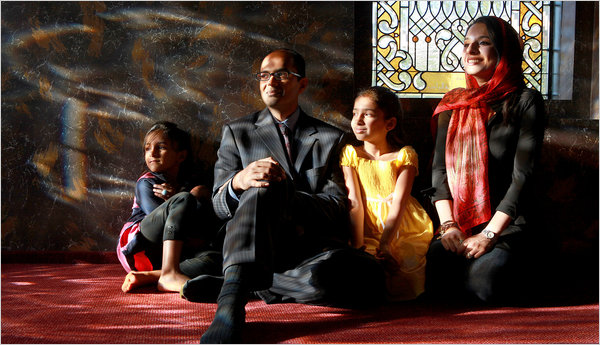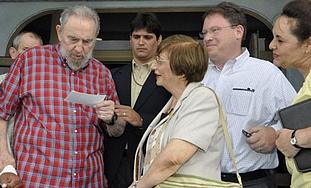
Arguments about the construction of an Islamic center and the destruction of Qurans may have less to do with Islam than they have with who gets to define America and why this nation is grappling with its own identity.
The New York Times reports:
Prominent Christian, Jewish and Muslim leaders held an extraordinary “emergency summit” meeting in the capital on Tuesday to denounce what they called “the derision, misinformation and outright bigotry” aimed at American Muslims during the controversy over the proposed Islamic community center near ground zero.
“This is not America,” said Cardinal Theodore E. McCarrick, the emeritus Roman Catholic archbishop of Washington, flanked by three dozen clergy members and religious leaders at a packed news conference at the National Press Club. “America was not built on hate.”
They said they were alarmed that the “anti-Muslim frenzy” and attacks at several mosques had the potential not only to tear apart the country, but also to undermine the reputation of America as a model of religious freedom and diversity.
The imam behind the plan to build an Islamic center near ground zero, Feisal Abdul Rauf, finally spoke out about the controversy, saying in an opinion piece in The New York Times published Tuesday night that he would proceed with plans to build the center. He wrote that by backing down, “we cede the discourse and, essentially, our future to radicals on both sides.”
The meeting in Washington occurred amid growing concern by the White House, the State Department and the top American military commander in Afghanistan over plans by Terry Jones, the pastor of a small church in Florida, to burn copies of the Koran on the anniversary of the Sept. 11 attacks.
Gen. David H. Petraeus warned on Tuesday that any video of Americans burning the Koran “would undoubtedly be used by extremists in Afghanistan — and around the world — to inflame public opinion and incite violence,” endangering the lives of American soldiers.
A State Department spokesman called Mr. Jones’s plan “un-American.” Robert Gibbs, the White House spokesman, said any activity “that puts our troops in harm’s way would be a concern to this administration.”
Several clergy members in Washington and Florida said that there were efforts to dissuade Mr. Jones from proceeding with the event, but that he appeared unlikely to relent.
The religious leaders in Washington said in their statement, “We are appalled by such disrespect for a sacred text that for centuries has shaped many of the great cultures of our world.”
Interfaith events are not unusual, but this one was extraordinary for the urgency and passion expressed by the participants. Some of the same religious leaders later met with Attorney General Eric H. Holder Jr. to urge him to prosecute religious hate crimes aggressively.
Rabbi David Saperstein, director of the Religious Action Center of Reform Judaism, said: “We know what it is like when people have attacked us physically, have attacked us verbally, and others have remained silent. It cannot happen here in America in 2010.”
The problem with any argument that revolves around contesting views about the true identity of this country is that neither side is attempting to differentiate between the America of their convictions and America as actuality.
Cardinal McCarrick can say, “This is not America,” but in fact it is — it just happens to be uglier than he would like it to be.
As an ideological debate, this is ostensibly an argument between on the one hand those who fully include Muslims in the idea of America, and on the other hand those who demand that Muslims must shed or at least modify their identities if they wish to be accepted in this society.
The problem is that a Muslim voice is barely audible on either side of the debate — evidence that the proponents of inclusion are describing an ideal that is far from having been realized.
Feisal Abdul Rauf, whose Cordoba House project has been at the center of the argument and who has just returned from a two-month overseas trip sponsored by the State Department, said in an op-ed in today’s New York Times: “I felt that it would not be right to comment from abroad.”
Not right? Maybe closer the truth was that he knew that if he spoke from the Middle East, his words would more likely be perceived not as those of an American but as a representative of that region and thus they would reinforce the image of Muslims in America as outsiders.
In the context of rising Islamophobia, American Muslims are in retreat, yet the lower the profile they assume, the more empowered the anti-Muslim voice becomes.
The New York Times reported on Sunday:
Muslims sit in their living rooms, aghast as pundits assert over and over that Islam is not a religion at all but a political cult, that Muslims cannot be good Americans and that mosques are fronts for extremist jihadis. To address what it calls a “growing tide of fear and intolerance,” the Islamic Society of North America plans to convene a summit of Christian, Muslim and Jewish leaders in Washington on Tuesday.
Young American Muslims who are trying to figure out their place and their goals in life are particularly troubled, said Imam Abdullah T. Antepli, the Muslim chaplain at Duke University.
“People are discussing what is the alternative if we don’t belong here,” he said. “There are jokes: When are we moving to Canada, when are we moving to Sydney? Nobody will go anywhere, but there is hopelessness, there is helplessness, there is real grief.”
Mr. Antepli just returned from a trip last month with a rabbi and other American Muslim leaders to Poland and Germany, where they studied the Holocaust and the events that led up to it (the group issued a denunciation of Holocaust denial on its return).
“Some of what people are saying in this mosque controversy is very similar to what German media was saying about Jews in the 1920s and 1930s,” he said. “It’s really scary.”
The Anti-Defamation League has formed an Interfaith Coalition on Mosques (ICOM) which aims to “provide support and stand with Muslims when their rights are being violated,” but the credibility of this initiative is undermined by the ADL’s own opposition to the construction of the Cordoba Islamic center. They might have quickly realized that that was a political blunder but it remains to be seen whether ICOM is more than a PR exercise designed to repair the ADL’s tattered image.
Aside from the question about whether the ADL can be true to its core mission and fight “to secure justice and fair treatment to all,” the proponents of a more libertarian and inclusive vision of American society face a deeper problem. We belong to a minority and there are inherent limits on the extent to which any minority can exert its will. We should thus perhaps more explicitly focus on what we want America to become than profess to represent its current condition.



 The 27-year-old’s parents didn’t even know their daughter was in Iraq until they were informed of her death. The fact that she committed suicide was concealed by the military for several more years — the most likely reason for the cover-up being that it was Peterson’s unwillingness to participate in torture that drove her to take her own life.
The 27-year-old’s parents didn’t even know their daughter was in Iraq until they were informed of her death. The fact that she committed suicide was concealed by the military for several more years — the most likely reason for the cover-up being that it was Peterson’s unwillingness to participate in torture that drove her to take her own life.
 A
A 
